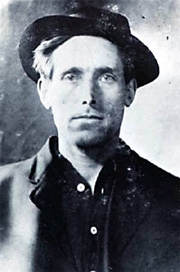On this date in 1879, union organizer and songwriter Joe Hill (né Joel Hagglund) was born in Gavle, Sweden. His parents were devout Lutherans who enjoyed music, filling their home with song. Only 9 when his father died, Hill had to leave school and go to work to help support the family. At 20 he was diagnosed with skin and joint tuberculosis. His mother died of complications from a back operation when Hill was 22 and he and a brother emigrated to America.
He worked at various laborer jobs and as a union organizer while writing songs about the working class that became part of the International Workers of the World’s (the Wobblies) “Little Red Song Book.” Hill’s songs include “The Tramp,” “There Is Power in the Union,” “Rebel Girl” and “Casey Jones, Union Scab.” His irreverent classic, “The Preacher and the Slave,” parodied the hymn “In the Sweet Bye and Bye” and lampooned the Salvation Army as the Starvation Army. (See lyrics below and listen here to Utah Phillips singing it.)
In 1914 a Utah grocer and his son were killed in their store and police picked up Hill, an unpopular newcomer to the Utah scene who had just been treated for a gunshot wound by a physician. Hill didn’t help himself, refusing (gallantly, his defenders maintained) to provide details about his alibi involving being shot in a woman’s room by a rival. Although the evidence was circumstantial and contradictory, he was found guilty. An international outcry ensued. Helen Keller came to his defense. President Woodrow Wilson intervened twice to try to prevent the execution but on Nov. 19, 1915, he was executed.
Just before his death he had written to the former president of the Western Federation of Miners, Bill Haywood, “Goodbye Bill: I die like a true rebel. Don’t waste any time mourning, organize!” Then he quipped, “It is a hundred miles from here to Wyoming. Could you arrange to have my body hauled to the state line to be buried? I don’t want to be found dead in Utah.” Following his wishes, his ashes were distributed to every IWW local except for the one in Utah. More than 30,000 people attended his funeral. According to an article in the Deseret Evening News, “No creed or religion found a place at the service. There were no prayers and no hymns, but there was a mighty chorus of voices singing songs written by Hill.”
The mournful but hopeful ballad “Joe Hill,” written by Alfred Hayes and set to music by Earl Robinson, commemmorates his work: “I dreamed I saw Joe Hill last night / Alive as you and me / Says I but Joe you’re ten years dead / I never died says he / I never died says he.” … “From San Diego up to Maine / In every mine and mill / Where workers strike and organize / It’s there you’ll find Joe Hill / It’s there you’ll find Joe Hill.” (D. 1915)


